初中英语被动语态讲解
- 格式:doc
- 大小:32.00 KB
- 文档页数:3
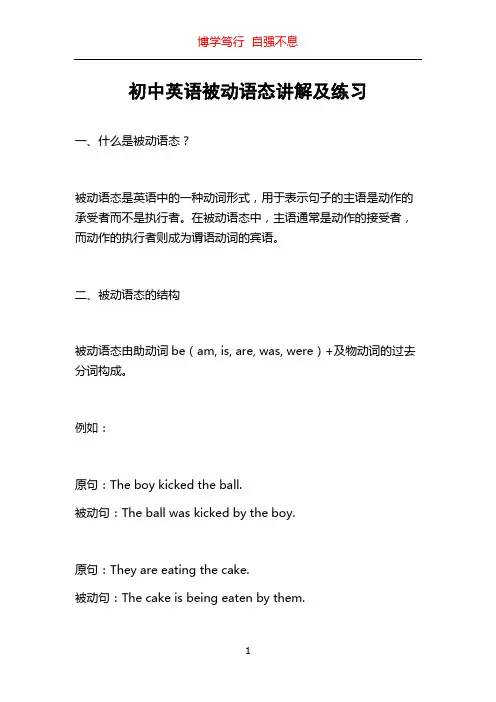
初中英语被动语态讲解及练习一、什么是被动语态?被动语态是英语中的一种动词形式,用于表示句子的主语是动作的承受者而不是执行者。
在被动语态中,主语通常是动作的接受者,而动作的执行者则成为谓语动词的宾语。
二、被动语态的结构被动语态由助动词be(am, is, are, was, were)+及物动词的过去分词构成。
例如:原句:The boy kicked the ball.被动句:The ball was kicked by the boy.原句:They are eating the cake.被动句:The cake is being eaten by them.三、被动语态的用法1. 当我们不知道或不关心动作的执行者是谁时,常常使用被动语态。
例如:The book was written in 2005.(这本书是2005年写的。
)The window has been broken.(窗户已经被打破了。
)2. 当动作的执行者已经知道或不需要强调时,可以使用被动语态。
例如:English is spoken all over the world.(英语在世界各地都被使用。
)The car was repaired by the mechanic.(这辆车是由机修工修理的。
)3. 当我们想要强调动作的接受者时,可以使用被动语态。
例如:The cake was eaten by Tom.(这块蛋糕是汤姆吃掉的。
)The book was read by all the students.(这本书被所有学生读过。
)四、被动语态的时态和语态转换1. 一般现在时的被动语态被动语态的一般现在时由am/is/are + 过去分词构成。
例如:原句:They build a house.(他们造了一座房子。
)被动句:A house is built by them.(一座房子被他们造了。
)2. 一般过去时的被动语态被动语态的一般过去时由was/were + 过去分词构成。
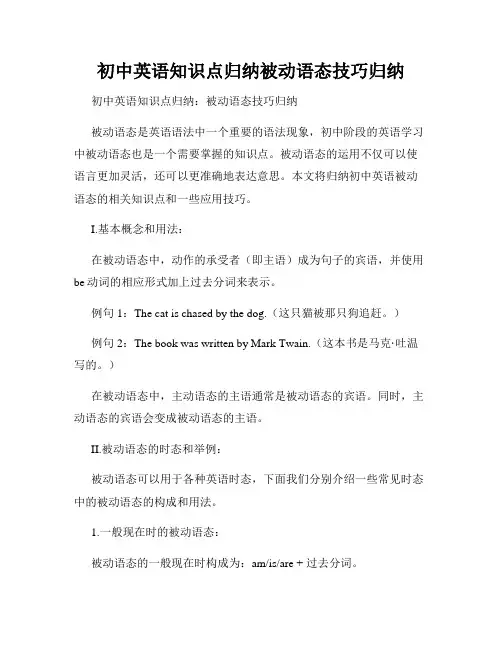
初中英语知识点归纳被动语态技巧归纳初中英语知识点归纳:被动语态技巧归纳被动语态是英语语法中一个重要的语法现象,初中阶段的英语学习中被动语态也是一个需要掌握的知识点。
被动语态的运用不仅可以使语言更加灵活,还可以更准确地表达意思。
本文将归纳初中英语被动语态的相关知识点和一些应用技巧。
I.基本概念和用法:在被动语态中,动作的承受者(即主语)成为句子的宾语,并使用be动词的相应形式加上过去分词来表示。
例句1:The cat is chased by the dog.(这只猫被那只狗追赶。
)例句2:The book was written by Mark Twain.(这本书是马克·吐温写的。
)在被动语态中,主动语态的主语通常是被动语态的宾语。
同时,主动语态的宾语会变成被动语态的主语。
II.被动语态的时态和举例:被动语态可以用于各种英语时态,下面我们分别介绍一些常见时态中的被动语态的构成和用法。
1.一般现在时的被动语态:被动语态的一般现在时构成为:am/is/are + 过去分词。
例句1:The window is cleaned by me every week.(这扇窗户每周都被我清理。
)例句2:English books are read by students in the library.(学生们在图书馆阅读英语书。
)2.一般过去时的被动语态:被动语态的一般过去时构成为:was/were + 过去分词。
例句1:The cake was eaten by him yesterday.(这个蛋糕昨天被他吃掉了。
)例句2:The letter was sent by my mother last week.(这封信是我妈妈上周寄出的。
)3.一般将来时的被动语态:被动语态的一般将来时构成为:will be + 过去分词。
例句1:The party will be held by us next month.(派对将由我们来举办。
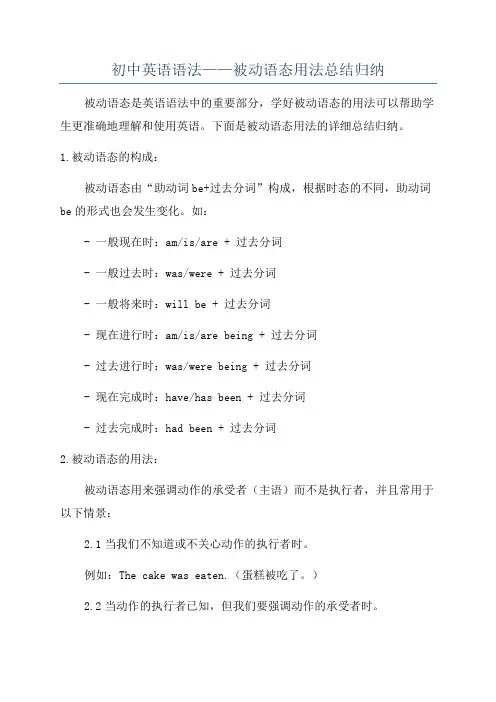
初中英语语法——被动语态用法总结归纳被动语态是英语语法中的重要部分,学好被动语态的用法可以帮助学生更准确地理解和使用英语。
下面是被动语态用法的详细总结归纳。
1.被动语态的构成:被动语态由“助动词be+过去分词”构成,根据时态的不同,助动词be的形式也会发生变化。
如:- 一般现在时:am/is/are + 过去分词- 一般过去时:was/were + 过去分词- 一般将来时:will be + 过去分词- 现在进行时:am/is/are being + 过去分词- 过去进行时:was/were being + 过去分词- 现在完成时:have/has been + 过去分词- 过去完成时:had been + 过去分词2.被动语态的用法:被动语态用来强调动作的承受者(主语)而不是执行者,并且常用于以下情景:2.1当我们不知道或不关心动作的执行者时。
例如:The cake was eaten.(蛋糕被吃了。
)2.2当动作的执行者已知,但我们要强调动作的承受者时。
例如:The house was built by my grandfather.(这座房子是我爷爷建的。
)2.3当我们要避免使用第一人称或第二人称时。
例如:Mistakes were made.(犯了错误。
)3.被动语态的注意事项:在使用被动语态时,需要注意以下几点:3.1表示动作的动词要用过去分词形式。
过去分词的形式有规律变化和不规律变化两种。
如:- 规律变化:原形 + ed,例如:played, watched, called- 不规律变化:需要记忆,例如:born, written, eaten3.2被动句的主语是动作的承受者,通常出现在句子的前面。
如:- 主动语态:I cooked dinner.(我做了晚饭。
)- 被动语态:Dinner was cooked by me.(晚饭是我做的。
)3.3 不及物动词不能构成被动语态。
不及物动词没有宾语,因此不能强调动作的承受者。
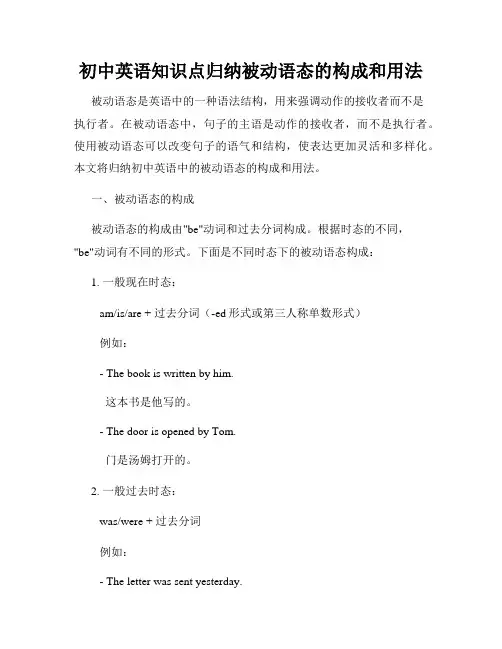
初中英语知识点归纳被动语态的构成和用法被动语态是英语中的一种语法结构,用来强调动作的接收者而不是执行者。
在被动语态中,句子的主语是动作的接收者,而不是执行者。
使用被动语态可以改变句子的语气和结构,使表达更加灵活和多样化。
本文将归纳初中英语中的被动语态的构成和用法。
一、被动语态的构成被动语态的构成由"be"动词和过去分词构成。
根据时态的不同,"be"动词有不同的形式。
下面是不同时态下的被动语态构成:1. 一般现在时态:am/is/are + 过去分词(-ed形式或第三人称单数形式)例如:- The book is written by him.这本书是他写的。
- The door is opened by Tom.门是汤姆打开的。
2. 一般过去时态:was/were + 过去分词例如:- The letter was sent yesterday.这封信昨天被寄出了。
- The cake was made by my mom.这个蛋糕是我妈妈做的。
3. 一般将来时态:will be + 过去分词例如:- The package will be delivered tomorrow.这个包裹将会在明天被送到。
- The decision will be made by the committee.决定将由委员会做出。
4. 现在进行时态:am/is/are being + 过去分词例如:- The house is being cleaned by the maid.这所房子正在被女佣清理。
- The project is being discussed by the team.这个项目正在团队讨论中。
5. 过去进行时态:was/were being + 过去分词例如:- The car was being repaired last week.这辆车上周正在维修。
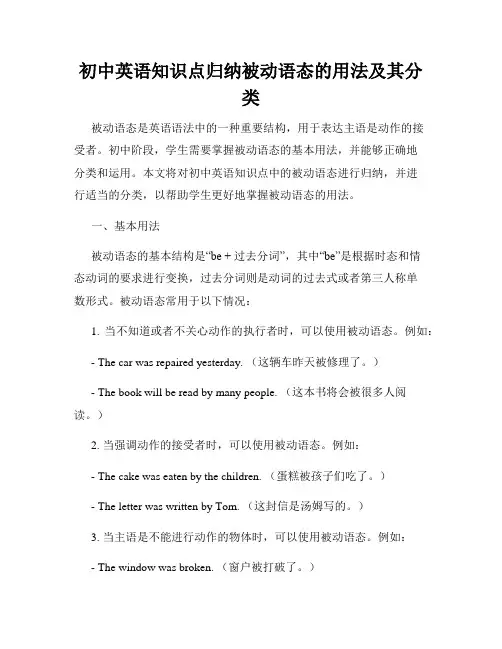
初中英语知识点归纳被动语态的用法及其分类被动语态是英语语法中的一种重要结构,用于表达主语是动作的接受者。
初中阶段,学生需要掌握被动语态的基本用法,并能够正确地分类和运用。
本文将对初中英语知识点中的被动语态进行归纳,并进行适当的分类,以帮助学生更好地掌握被动语态的用法。
一、基本用法被动语态的基本结构是“be + 过去分词”,其中“be”是根据时态和情态动词的要求进行变换,过去分词则是动词的过去式或者第三人称单数形式。
被动语态常用于以下情况:1. 当不知道或者不关心动作的执行者时,可以使用被动语态。
例如:- The car was repaired yesterday. (这辆车昨天被修理了。
)- The book will be read by many people. (这本书将会被很多人阅读。
)2. 当强调动作的接受者时,可以使用被动语态。
例如:- The cake was eaten by the children. (蛋糕被孩子们吃了。
)- The letter was written by Tom. (这封信是汤姆写的。
)3. 当主语是不能进行动作的物体时,可以使用被动语态。
例如:- The window was broken. (窗户被打破了。
)- The ball was kicked into the goal. (球被踢进了球门。
)二、被动语态的分类根据动词的不同性质和用法,被动语态可以进行分类,下面将对常见的几种分类进行介绍。
1. 一般现在时被动语态一般现在时的被动语态结构为“am/is/are + 过去分词”。
该时态常用于描述客观事实或者重复性的动作。
例如:- The car is washed every week. (这辆车每周都被洗。
)- English is spoken in many countries. (英语在很多国家被使用。
)2. 一般过去时被动语态一般过去时的被动语态结构为“was/were + 过去分词”。

初中英语语法——被动语态用法总结归纳被动语态是英语语法中的一种重要的句型结构,用来表示主语是动作的承受者,或者是主语被动地接受了其中一种行为或影响。
在被动语态中,动作的执行者通常不被说明,而动作的接受者(主语)成为句子的重点。
被动语态的结构是:“be”动词的适当形式 + 过去分词被动语态的时态、语态和主动语态一样,即可以变换时态(一般现在时、一般过去时、一般将来时等)和语态(进行时、完成时等)。
下面对被动语态的几个方面进行总结归纳。
1.一般现在时被动语态:一般现在时被动语态的结构是:“am/is/are”(be动词的适当形式)+ 过去分词例如:- 主动语态:They make cars.- 被动语态:Cars are made by them.2.一般过去时被动语态:一般过去时被动语态的结构是:“was/were”(be动词的适当形式)+ 过去分词例如:- 主动语态:She cooked dinner.- 被动语态:Dinner was cooked by her.3.一般将来时被动语态:一般将来时被动语态的结构是:“will be”(be动词的适当形式)+ 过去分词例如:- 主动语态:You will clean the room.- 被动语态:The room will be cleaned by you.4.进行时被动语态:进行时被动语态的结构是:“am/is/are being”(be动词的适当形式)+ 过去分词例如:- 主动语态:They are painting the wall.- 被动语态:The wall is being painted by them.5.完成时被动语态:完成时被动语态的结构是:“has/have been”(be动词的适当形式)+ 过去分词例如:- 主动语态:She has written a book.- 被动语态:A book has been written by her.需要注意的是,被动语态的主语通常不是动作的执行者,所以经常用于下面几种情况:-当动作的执行者不得而知或不重要时,使用被动语态。

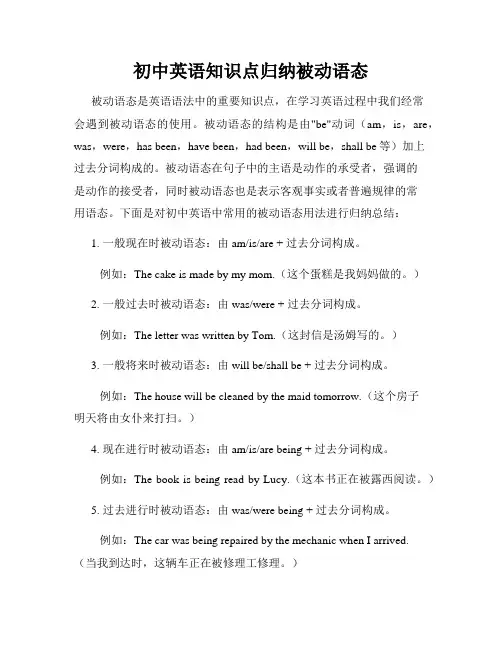
初中英语知识点归纳被动语态被动语态是英语语法中的重要知识点,在学习英语过程中我们经常会遇到被动语态的使用。
被动语态的结构是由"be"动词(am,is,are,was,were,has been,have been,had been,will be,shall be等)加上过去分词构成的。
被动语态在句子中的主语是动作的承受者,强调的是动作的接受者,同时被动语态也是表示客观事实或者普遍规律的常用语态。
下面是对初中英语中常用的被动语态用法进行归纳总结:1. 一般现在时被动语态:由am/is/are + 过去分词构成。
例如:The cake is made by my mom.(这个蛋糕是我妈妈做的。
)2. 一般过去时被动语态:由was/were + 过去分词构成。
例如:The letter was written by Tom.(这封信是汤姆写的。
)3. 一般将来时被动语态:由will be/shall be + 过去分词构成。
例如:The house will be cleaned by the maid tomorrow.(这个房子明天将由女仆来打扫。
)4. 现在进行时被动语态:由am/is/are being + 过去分词构成。
例如:The book is being read by Lucy.(这本书正在被露西阅读。
)5. 过去进行时被动语态:由was/were being + 过去分词构成。
例如:The car was being repaired by the mechanic when I arrived.(当我到达时,这辆车正在被修理工修理。
)6. 情态动词被动语态:由情态动词(can,could,may,might,must,should,would等)+ be + 过去分词构成。
例如:The film can be watched online.(这部电影可以在线观看。
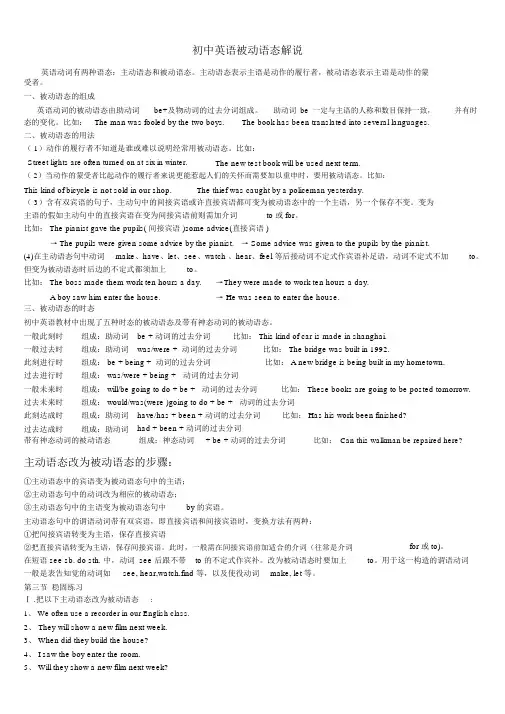
初中英语被动语态解说英语动词有两种语态:主动语态和被动语态。
主动语态表示主语是动作的履行者,被动语态表示主语是动作的蒙受者。
一、被动语态的组成英语动词的被动语态由助动词be+及物动词的过去分词组成。
助动词be一定与主语的人称和数目保持一致,态的变化。
比如:The man was fooled by the two boys.The book has been translated into several languages.二、被动语态的用法( 1)动作的履行者不知道是谁或难以说明经常用被动语态。
比如:并有时Street lights are often turned on at six in winter.The new test book will be used next term.( 2)当动作的蒙受者比起动作的履行者来说更能惹起人们的关怀而需要加以重申时,要用被动语态。
比如:This kind of bicycle is not sold in our shop.The thief was caught by a policeman yesterday.( 3)含有双宾语的句子,主动句中的间接宾语或许直接宾语都可变为被动语态中的一个主语,另一个保存不变。
变为主语的假如主动句中的直接宾语在变为间接宾语前则需加介词to 或 for。
比如: The pianist gave the pupils( 间接宾语 )some advice(直接宾语 )→The pupils were given some advice by the pianist. → Some advice was given to the pupils by the pianist.(4)在主动语态句中动词make、have、let、see、watch 、hear、feel 等后接动词不定式作宾语补足语,动词不定式不加to。
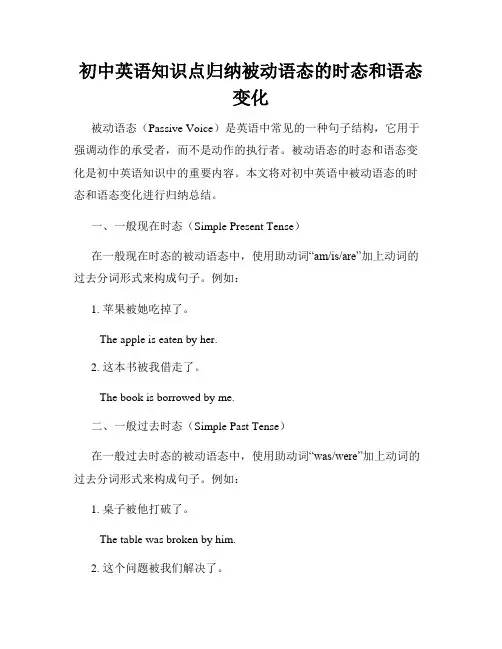
初中英语知识点归纳被动语态的时态和语态变化被动语态(Passive Voice)是英语中常见的一种句子结构,它用于强调动作的承受者,而不是动作的执行者。
被动语态的时态和语态变化是初中英语知识中的重要内容。
本文将对初中英语中被动语态的时态和语态变化进行归纳总结。
一、一般现在时态(Simple Present Tense)在一般现在时态的被动语态中,使用助动词“am/is/are”加上动词的过去分词形式来构成句子。
例如:1. 苹果被她吃掉了。
The apple is eaten by her.2. 这本书被我借走了。
The book is borrowed by me.二、一般过去时态(Simple Past Tense)在一般过去时态的被动语态中,使用助动词“was/were”加上动词的过去分词形式来构成句子。
例如:1. 桌子被他打破了。
The table was broken by him.2. 这个问题被我们解决了。
The problem was solved by us.三、一般将来时态(Simple Future Tense)在一般将来时态的被动语态中,使用助动词“will be”加上动词的过去分词形式来构成句子。
例如:1. 这个房子将会被他们出租。
The house will be rented by them.2. 这首歌将会被我演唱。
The song will be sung by me.四、现在进行时态(Present Continuous Tense)在现在进行时态的被动语态中,使用助动词“am/is/are being”加上动词的过去分词形式来构成句子。
例如:1. 这个项目正在被我们进行中。
The project is being carried out by us.2. 此刻书桌正在被她打扫。
The desk is being cleaned by her.五、过去进行时态(Past Continuous Tense)在过去进行时态的被动语态中,使用助动词“was/were being”加上动词的过去分词形式来构成句子。
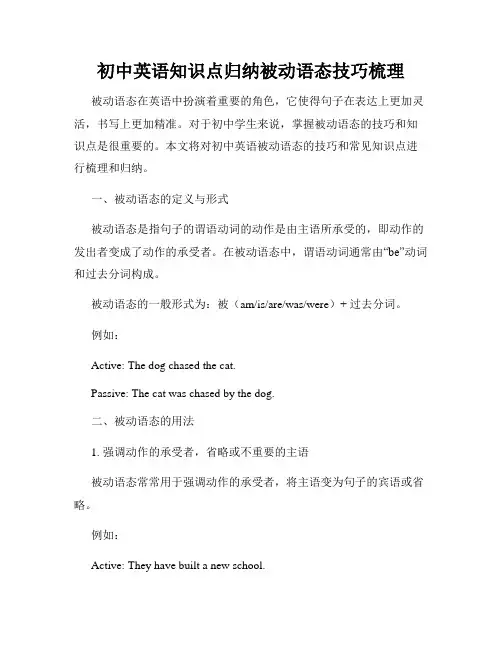
初中英语知识点归纳被动语态技巧梳理被动语态在英语中扮演着重要的角色,它使得句子在表达上更加灵活,书写上更加精准。
对于初中学生来说,掌握被动语态的技巧和知识点是很重要的。
本文将对初中英语被动语态的技巧和常见知识点进行梳理和归纳。
一、被动语态的定义与形式被动语态是指句子的谓语动词的动作是由主语所承受的,即动作的发出者变成了动作的承受者。
在被动语态中,谓语动词通常由“be”动词和过去分词构成。
被动语态的一般形式为:被(am/is/are/was/were)+ 过去分词。
例如:Active: The dog chased the cat.Passive: The cat was chased by the dog.二、被动语态的用法1. 强调动作的承受者,省略或不重要的主语被动语态常常用于强调动作的承受者,将主语变为句子的宾语或省略。
例如:Active: They have built a new school.Passive: A new school has been built (by them).2. 不知道或没必要说出动作的执行者当不知道或没必要表达出动作的执行者时,可以使用被动语态。
例如:Active: Someone has stolen my wallet.Passive: My wallet has been stolen.三、被动语态的时态和语态转换1. 时态转换当句子的主动语态中有谓语动词的时态,要转换成被动语态时,需要保持相应的时态。
即将主动语态中的谓语动词改为相应的被动语态形式。
例如:Active: They are repairing the car.Passive: The car is being repaired by them.2. 语态转换当句子的主动语态中有情态动词或者特殊动词时,要转换成被动语态时,需要用相应的be动词和过去分词形式。
例如:Active: You must clean your room.Passive: Your room must be cleaned.四、常见的被动语态动词有一些常见的及物动词在被动语态中使用较多,这些动词包括:give, send, bring, make, tell, show, teach, tell, explain, etc.例如:Active: He gave me a present.Passive: I was given a present by him.五、被动语态的注意事项1. 不及物动词不能构成被动语态不及物动词本身已经表示没有宾语的动作,所以不能构成被动语态。
初中英语【被动语态】用法及易错点详细讲解所谓“被动语态”,相当于中文中常说的“被……”、“由……”的句式,如:“他的自行车被偷了”、“这座楼房是由他们建造的。
”一、主动语态和被动语态的概念1)He opened the door. 他开了门。
以上例句是一个主动句,主语是动作的执行者/发出者2)The door was opened by him. 门被开了。
第二个例句是一个被动句,主语是动作的承受者汉语中表示被动的词:被…/ 由…/ 受…/ 给…英语中表被动用:be+过去分词构成二、被动语态的结构及用法1)被动语态的几种句型肯定句:主语+be+及物动词的过去分词+(by)eg: My phone was made in China.否定句:主语+be not+过去分词+(by)eg: My phone wasn’t made in China.一般疑问句:Be+主语+过去分词+(by)?eg: Was your phone made in China?特殊疑问句:特殊疑问词+be+主语+过去分词+(by)?第 1 / 26 页eg: Where was your phone made?2)不同时态中的被动语态3)被动语态的用法当不知道或没有必要指出动作的执行者时,常用被动语态,这时往往不用by 短语。
The front window in the classroom was broken yesterday.昨天,教室的前窗被打破了。
(不知谁打破的)They have been poorly paid.他们的工资太低。
(没必要指出工资是谁付的)突出或强调动作的承受者,如果需要说出动作的执行者,用by短语。
These books are written especially for children.这些书是专门为孩子们写的。
(强调的是“这些书”)三、主动语态变被动语态1)一般情况下主动语态变被动语态主动句:He closed the door.第 2 / 26 页变被动句:The door was closed by him.口诀:宾变主,主变宾,谓变be done, 时不变,数格必须随被变。
初中英语语法专题讲义:被动语态1. 什么是被动语态?被动语态是英语的一种语法形式,表示主语是动作的承受者,而不是动作执行者的语态。
被动语态的组成方式为:be动词 + 过去分词。
举个例子:主动语态:The cat ate the fish. (猫吃了鱼。
)被动语态:The fish was eaten by the cat. (鱼被猫吃了。
)2. 被动语态的构成被动语态的构成方式如下:- 一般现在时:am/is/are + 过去分词- 一般过去时:was/were + 过去分词- 现在进行时:am/is/are being + 过去分词- 过去进行时:was/were being + 过去分词- 现在完成时:have/has been + 过去分词- 过去完成时:had been + 过去分词3. 被动语态的用法被动语态主要用于以下几种情况:- 当不知道或不关心动作的执行者时。
- 当强调动作的承受者时。
- 当动作的执行者是显而易见的时。
举个例子:When were you born? (你什么时候出生的?)→ When was he born?(他什么时候出生的?)The book was written by her. (这本书是她写的。
)The cake was made by my mother. (这个蛋糕是我妈妈做的。
)4. 注意事项在考虑是否使用被动语态时,需要注意以下几点:- 主动语态比被动语态更加直接和生动。
- 使用被动语态时,需要确保句子的主语是动作的承受者。
- 需要适当地使用被动语态,不要过度使用。
5. 练题将下列主动语态改写为被动语态。
1. The teacher explains the grammar rules.3. We have finished the homework.4. The children are painting the wall.答案:1. The grammar rules are explained by the teacher.3. The homework has been finished by us.4. The wall is being painted by the children.。
初中英语知识点归纳常用的被动语态和被动语态句型被动语态是英语语法中的重要内容之一。
在句子中,被动语态可用于强调动作的承受者,或者当我们的关注点是动作的执行者时。
本文将对常用的被动语态和被动语态句型进行归纳总结。
一、被动语态的构成及用法1. 构成:be动词(am/is/are/was/were)+过去分词(-ed结尾或不规则形式)2. 用法:强调承受动作的对象,或者当对动作进行描述时。
例如:Active: The cat chased the mouse.Passive: The mouse was chased by the cat.二、常用的被动语态句型1. 一般现在时被动语态结构:am/is/are + 过去分词用法:描述经常发生的动作或者普遍真理。
例如:Active: They build houses in this area.Passive: Houses are built in this area.2. 一般过去时被动语态结构:was/were + 过去分词用法:描述过去某个时间发生的动作或事件。
例如:Active: He repaired the car yesterday.Passive: The car was repaired by him yesterday.3. 现在进行时被动语态结构:am/is/are being + 过去分词用法:描述现在正在进行的动作或事件。
例如:Active: They are building a new bridge.Passive: A new bridge is being built by them.4. 过去进行时被动语态结构:was/were being + 过去分词用法:描述过去某一时刻正在进行的动作或事件。
例如:Active: He was writing a letter at that time.Passive: A letter was being written by him at that time.5. 现在完成时被动语态结构:has/have been + 过去分词用法:表达过去发生的动作对现在造成的影响或结果。
初中英语知识点归纳被动语态和被动语态的用法区别初中英语知识点归纳:被动语态和被动语态的用法区别被动语态是英语语法中的一个重要部分,它与主动语态相对应。
被动语态经常在写作和口语中使用,使句子更加灵活多样。
本文将归纳被动语态的基本形式和用法,并比较被动语态与主动语态的区别。
一、被动语态的基本形式被动语态由“be”动词(am, is, are, was, were等)加上及物动词的过去分词构成。
主动句变被动句的基本过程如下:主动句:主语 + 动词 + 宾语被动句:宾语 + be动词(根据主语的人称和数变化)+ 过去分词 + by + 主语(可省略)例如:主动句:They made a cake.(他们做了一个蛋糕。
)被动句:A cake was made by them.(一个蛋糕被他们做了。
)二、被动语态的用法1. 强调动作的承受者或不知道动作的执行者:当句子的执行者或者并不重要时,使用被动语态可以强调动作的承受者。
例如:主动句:Sam painted the wall.(山姆刷了墙。
)被动句:The wall was painted by Sam.(墙被山姆刷了。
)2. 在不知道主语是谁或者不想透露主语时:有时候,为了保持匿名或者模糊句子的主体,可以使用被动语态。
例如:主动句:Someone stole my phone. (有人偷了我的手机。
)被动句:My phone was stolen.(我的手机被偷了。
)3. 在描述自然现象或普遍事实时:有些句子中,使用被动语态可以更准确地描述自然现象或普遍事实。
例如:主动句:People say that dogs are faithful.(人们说狗是忠诚的。
)被动句:It is said that dogs are faithful.(据说狗是忠诚的。
)三、被动语态与主动语态的区别1. 语序和意义:被动句的语序为宾语+ be动词+ 过去分词,而主动句的语序为主语+动词+宾语。
初中英语知识点归纳被动语态的用法初中英语知识点归纳——被动语态的用法被动语态是英语语法中的一种常用句型,它用来表达主语是动作的承受者,而不是动作的执行者。
在初中英语学习中,掌握被动语态的用法对于提高语言表达的准确性至关重要。
本文将详细介绍初中英语中被动语态的用法。
一、被动语态的基本构成被动语态的构成由“be”动词的不同形式加上动词的过去分词组成。
其中,“be”动词的形式根据主语的不同而变化,包括is、am、are(现在时态)以及was、were(过去时态);过去分词则是动词的过去式形式。
例如:1. 现在时态的被动语态:The book is written by Peter.(这本书是彼得写的。
)2. 过去时态的被动语态:The house was built last year.(这所房子是去年建的。
)二、被动语态的用法被动语态在英语中广泛应用于多种语境,下面将介绍几种常见的用法。
1. 表示动作的承受者或受事者被动语态常用于强调动作的承受者或受事者,而不强调动作的执行者。
例如:The cake was made by my mom.(这个蛋糕是我妈妈制作的。
)The car was repaired by a mechanic.(这辆车是由一个机修工修理的。
)2. 不知道或没有必要提及动作的执行者有时候,我们并不知道或者没有必要提及动作的执行者,这时被动语态可以很好地解决这个问题。
例如:The window was broken.(窗户被打破了。
)The letter has been sent.(信已经寄出了。
)3. 形容词的被动用法有些形容词可以用于被动语态,表示事物属性或状态的变化。
例如:He is interested in science.(他对科学感兴趣。
)I am impressed by his performance.(他的表演给我留下了深刻印象。
)4. 与情态动词连用被动语态可以与情态动词连用,表示对某种可能性或许诺的推测。
初中语法被动语态讲解被动语态定义:英语中有两重语态:主动语态和被动语态。
主动语态中的主语是动作的执行者,被动语态中的主语是动作的承受者,即主动语态中的宾语。
所以只有及物动词才有被动语态。
规则:被动语态由“助动词be+及物动词的过去分词”构成。
第一,助动词be 要随着人称和数的变化而变化,第二,助动词be要随着时态的变化而变化。
一、被动语态的构成形式1. 被动语态的基本时态变化以do为例,各种时态的被动语态形式为:1) am/is/are +done (过去分词) 一般现在时例Visitors are requested not to touch the exhibits.2) was/were done 一般过去时例I was given ten minutes to decide whether I should reject the offer.3) shall/will be done 一般将来时例Hundreds of jobs will be lost if the factory closes.4) am/is /are being done 现在进行时例A new cinema is being built here(5) was/were being done 过去进行时例A meeting was being held when I was there.6) should/would be done 过去将来时例The news would be sent to the soldier's mother as soon as it arrived.7) has /have been done 现在完成时例All the preparations for the task have been completed, and we're ready tostart.8) had been done 过去完成时例 By the end of last year, another new gymnasium had been completed inBeijing.9) shall/will have been done 将来完成时(少用)例The project will have been completed before July.2(被动语态句型变化肯定句主语+be+过去分词+(by …)否定句主语+be not+过去分词+(by …)一般疑问句 Be+主语+过去分词+(by …)?特殊疑问句疑问词+be+主语+过去分词+ (by …),3. 被动语态的特殊形式1) 带情态动词的被动结构。
英语被动语态讲解
英语动词有两种语态:主动语态和被动语态。
主动语态表示主语是动作的执行者,被动语态表示主语是动作的承受者。
一、被动语态的构成
英语动词的被动语态由助动词be+及物动词的过去分词构成。
助动词be必须与主语的人称和数量保持一致,并有时态的变化。
例如:The man was fooled by the two boys. The book has been translated into several languages.
二、被动语态的用法
(1)动作的执行者不知道是谁或难以说明时常用被动语态。
例如:
Street lights are often turned on at six in winter. The new test book will be used next term.
(2)当动作的承受者比起动作的执行者来说更能引起人们的关心而需要加以强调时,要用被动语态。
例如:
This kind of bicycle is not sold in our shop. The thief was caught by a policeman yesterday.
(3)含有双宾语的句子,主动句中的间接宾语或者直接宾语都可变为被动语态中的一个主语,另一个保留不变。
变为主语的若是主动句中的直接宾语在变为间接宾语前则需加介词to 或for。
例如:The pianist gave the pupils(间接宾语)some advice(直接宾语)
→The pupils were given some advice by the pianist.→Some advice was given to the pupils by the pianist.
(4)在主动语态句中动词make、have、let、see、watch、hear、feel等后接动词不定式作宾语补足语,动词不定式不加to。
但变成被动语态时后面的不定式都须加上to。
例如:The boss made them work ten hours a day. →They were made to work ten hours a day.
A boy saw him enter the house. →He was seen to enter the house.
三、被动语态的时态
教材中出现了四种时态的被动语态及带有情态动词的被动语态。
一般现在时构成:助动词be + 动词的过去分词例如:This kind of car is made in shanghai.
一般过去时构成:助动词was/were + 动词的过去分词例如:The bridge was built in 1992.
现在进行时构成:be + being + 动词的过去分词例如:A new bridge is being built in my hometown.
一般将来时构成:will/be going to do + be + 动词的过去分词例如:These books are going to be posted tomorrow. 带有情态动词的被动语态构成:情态动词+ be + 动词的过去分词例如:Can this walkman be repaired here?
※主动语态改为被动语态的步骤:
①主动语态中的宾语变为被动语态句中的主语;
②主动语态句中的动词改为相应的被动语态;
③主动语态句中的主语变为被动语态句中by的宾语。
主动语态句中的谓语动词带有双宾语,即直接宾语和间接宾语时,转换方法有两种:
①把间接宾语转化为主语,保留直接宾语
②把直接宾语转化为主语,保留间接宾语。
此时,一般需在间接宾语前加适当的介词(通常是介词for或to)。
在短语see sb. do sth. 中,动词see后跟不带to的不定式作宾补。
改为被动语态时要加上to。
用于这一结构的谓语动词一般是表示知觉的动词如see, hear,watch,find等,以及使役动词make, let等。
第三节巩固练习
Ⅰ.把下列主动语态改为被动语态:
1、We often use a recorder in our English class.
2、They will show a new film next week.
3、When did they build the house?
4、I saw the boy enter the room.
5、Will they show a new film next week?
6、Have they posted the letter yet?
7、We often see him help his classmate.
8、You must turn off the light before you go to be.d
9、Who is repairing the bike?
10、The student should learn all the texts by heart.
Ⅱ.选择填空:
1. The reading room ________ yesterday afternoon.
A. cleaned
B. is cleaned
C. was cleaning
D. was cleaned
2. The workers were made ________ ten hours a day.
A. work
B. to work
C. working
D. worked
3. Food ________ in a cool place in summer.
A. must keep
B. mustn’t keep
C. must be kept
D. mustn’t be kept
4. His father ________ to work in Hong Kong 3 years ago.
A. sent
B. was sent
C. has sent
D. has been sent
5. The pen ________ well.
A. writes
B. is written
C. was written
D. writing
6. Great changes ________ in the town since 1988.
A. have taken place
B. have been taken place
C. has taken place
D. has been taken place
7. Our compositions must ________ next Monday.
A. be hand in
B. be handed in
C. handed in
D. be handing in
8. The child will ________ back to his parents next month.
A. sent
B. send
C. be sent
D. be sending
9. ____ his work ____ yet?
A. have…been finished
B. has …been finished
C. has …finished
D. have…finished
10. The classroom ________ now.
A. is cleaning
B. is being cleaning
C. is being cleaned
D. is cleaned
Ⅲ.用适当时态和语态的动词填空:
1、Can he ________ (speak) English?
2、What language ________ (speak) in that country?
3、The film ________ (show) many times since last Sunday.
4、These TV sets ________ (make) in Sichuan.
5、It has got so dark. Would you please ________ (turn) on the light?
6、A new hospital ________ (build) in this area now.
7、________ the book ________ (return).
8、Rice ________ (grow) in the south. 9、The window ________ (not break) by the boy.
10、I ________ (tell) he ________ (not come) just now.。